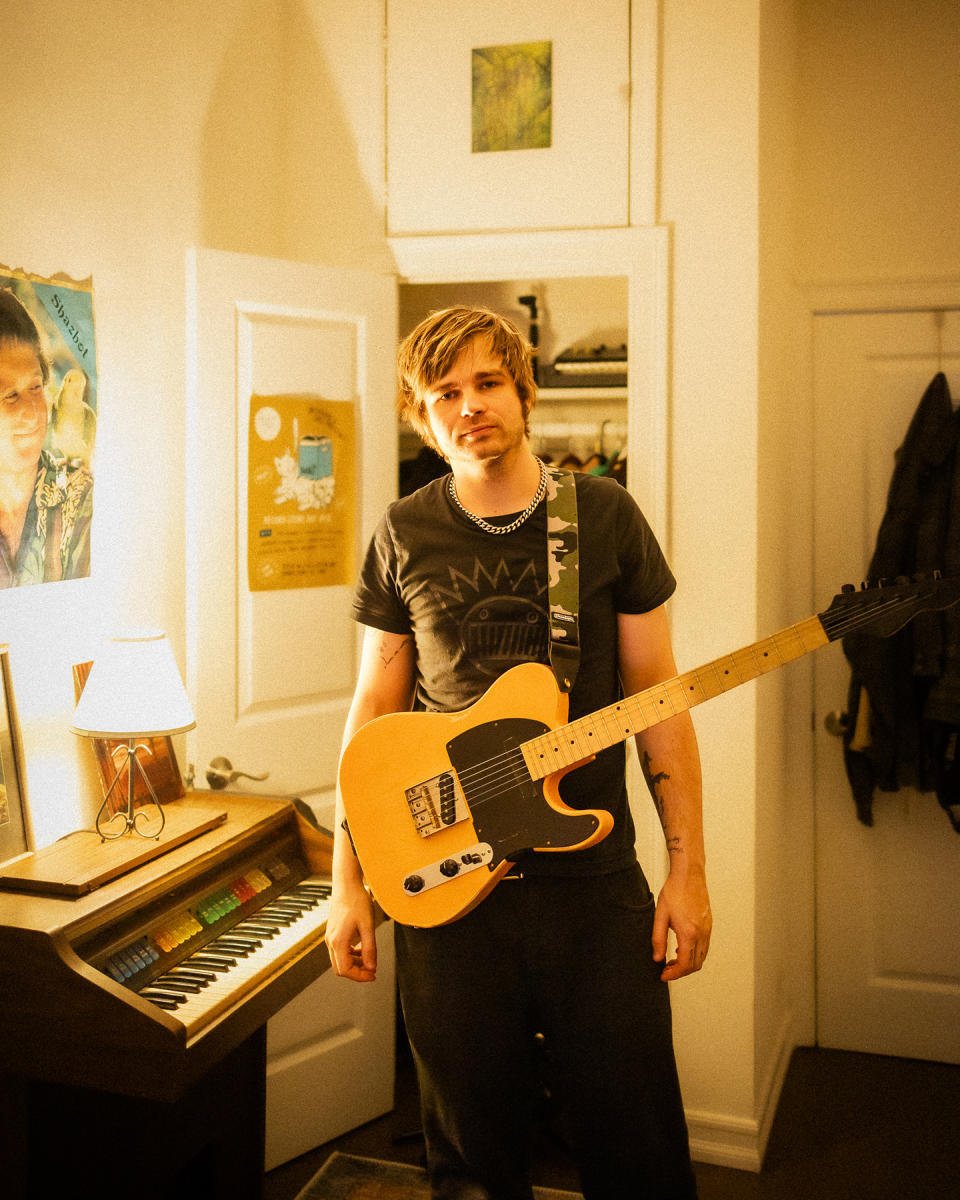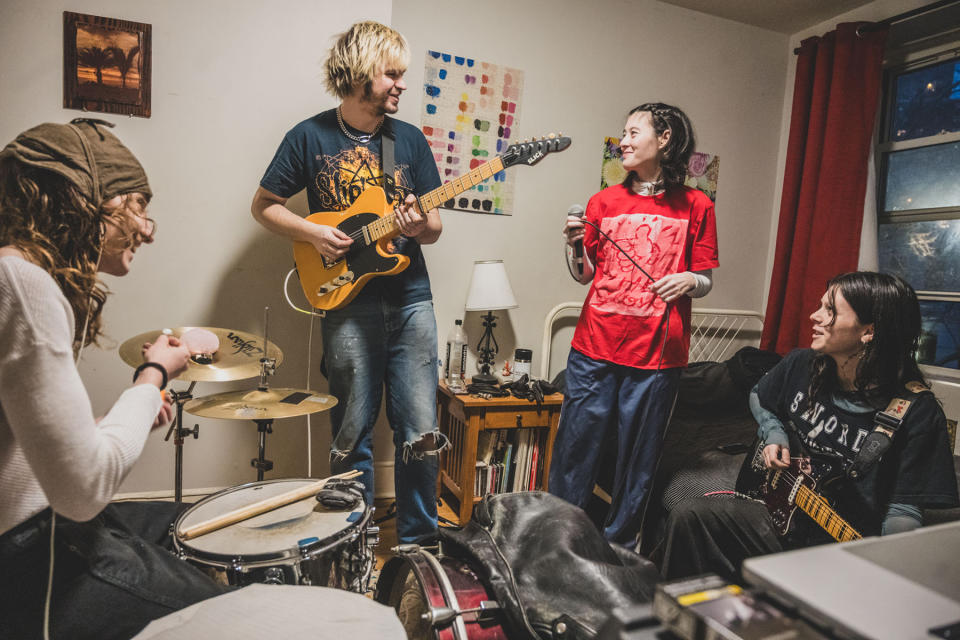A Mad Pop Scientist Reveals His Inner Singer-Songwriter

The first track on This Is Lorelei’s upcoming debut album is a sweet, sad song called “Angel’s Eye.” “So long, my lonely friend/Goodbye, my only love,” a high voice sings over gently rolling strums. It’s a pure, earnest country weeper, full of feeling in every note.
If you don’t already know, you might be surprised to learn that This Is Lorelei is an alias for Nate Amos, one of the mad-scientist minds behind the Brooklyn duo Water From Your Eyes. In that band, he twists strange, noisy riffs into postmodern pop beats for vocalist Rachel Brown to sing over. Water From Your Eyes are one of the weirdest, funniest, and most exciting bands in New York right now, and they’re on the verge of even bigger things after releasing a great album on Matador Records last year.
More from Rolling Stone
Trump Forced to See Mean Memes About Him Shared by Prospective Jurors
Here's Everything You Need to Know About Trump's New York Criminal Trial
Trump Posts $175 Million Bond in NY Civil Fraud Case, Averts Asset Seizure
But the music that Amos makes with Water From Your Eyes is only half the story. For more than a decade, he’s also been making out-there sounds under the name This Is Lorelei, spread across dozens of releases on Bandcamp. What he’s ready to show the world with Box for Buddy, Box for Star (out June 14 on DIY stronghold Double Double Whammy) is arguably the most unexpected entry in his catalog to date: a 10-track LP full of genuinely moving singer-songwriter material, soaked in heartache and Americana.
“I don’t think I ever would have sat down with a blank slate and said, ‘I’m going to make this kind of album,’” Amos, 33, says over a plate of larb and a side of fried chilis at a Thai street-food spot near his place in Bed-Stuy. “I don’t think it’s something I would have stumbled upon had I not made all the other bullshit.”
In some ways, this music is a long-overdue return to the sounds Amos was raised on. Growing up in Virginia and Vermont, he was introduced to the ABCs of songwriting by his dad, Bob Amos, a bluegrass musician who’s known for his original compositions in a genre that often centers on traditional standards. “He’s a Beatles fanatic, and he passed that on to me,” Amos says. “That’s kind of the closest thing to a religion that I’ve ever had.” (Rubber Soul was his dad’s favorite; he himself was drawn to the White Album.)
Living with his family on a rural mountainside in St. Johnsbury, Vermont — “They call it the Northeast Kingdom, according to hats I’ve seen,” he quips — Amos embraced a timeless teen-stoner lifestyle in high school. “I skipped class a lot and drove around and smoked a lot of weed on the dirt roads,” he says. His stereo on those rides might have been blasting anything from Death Cab to Avenged Sevenfold to some “obscure, lo-fi electronic stuff made by this dude who I found out about from my high school’s Wikipedia page, because I was trying to vandalize the Wikipedia page.”
After graduating in 2009 and moving across the state to Burlington, Amos got deeper into patterns that he’s only recently begun to untangle. “Honestly, I was just really into drugs,” he says, recalling those years of freedom and exploration. “But that’s also when I began to find the voice that I’ve been chasing down for the last 15 years now.”

He began using the name This Is Lorelei around 2013, after he relocated again to Chicago and put some of his worst habits behind him. He’d been playing in various bands, including a stint in his dad’s band, and he was getting into producing local artists in Chicago; This Is Lorelei is what he called the music he worked on when he went back home to St. Johnsbury for the holidays. “It’s always been a side project, but it’s existed longer than any other bands I’ve had,” he says. “It’s this eternal thing that’s always there.”
For a long time, This Is Lorelei remained an “arty, borderline ambient” project whose output wasn’t always recognizable as songs. One release got him blacklisted by the online distribution service DistroKid, he says, “because it was just 50 minutes of noise, and all the song titles were just letters and numbers …. I had this system where I could essentially put in 10 seconds of improvised anything and it would generate, like, 40 minutes of non-linear music. I got very deep into that area for a while.”
In the summer of 2019, Amos made a breakthrough. “I got really, really fixated on ‘All the Small Things’ by Blink-182, and was listening to all these covers of that song,” he says. “For a couple of weeks, I pretty much only listened to that song. My roommate thought I was going crazy. … Things being fast, catchy, and simple all of a sudden became a great interest to me. I was drifting out in experimentalism, and I was saved by Blink-182.”
He was living in New York, where he’d moved to be closer to Brown, his bandmate in Water From Your Eyes and his romantic partner at the time (they broke up that year, but have remained friends). Around this time, Amos’ two main pursuits began taking on their own distinct flavors. To generalize, Water From Your Eyes is about provocative pop experiments; This Is Lorelei is for more straightforwardly emotional verse/chorus songs. One makes you laugh and think, the other makes you feel. “It’s like playing two different sports,” he says. “They’re still related — like, you’re doing something physical — but it’s a different game.”
Amos had tried to get sober more than once, but it didn’t stick until around age 30, when he quit alcohol and amphetamines. “My alcoholism did hit a point where I really just had to stop for health reasons,” he says.
His vision for Box for Buddy, Box for Star began to come into focus a little less than a year later, in the spring of 2022, when he was on a U.K. tour with Water From Your Eyes. Naturally, they ended up at Stonehenge on a day off. “Rachel and I are both into monolithic structures,” he says. “Something about those ley lines. It’s kind of the coolest thing that exists.”
Lying under the ancient stones, he decided to take some time off from weed, too. “I’d been thinking about it for a while,” he says. “No reason, really. Just to see if I could do it.”
When he got back to New York, fully sober for the first extended period of time in many years, he put all his energy into songwriting. “The same way, with drugs or alcohol, you try to get more and more to make yourself happy — this album was a similar chase,” he says. “I was like, ‘Maybe if I write a good enough song, things will get better.’ That’s not how things get better, but that’s the way an addict thinks.” (He was also doing a possibly excessive number of pushups each day.)
As that summer went on, he found himself piecing together “a recovery album” that was unlike anything he’d done before. “I was writing tons of stuff, and the songs that I liked more were the ones that ended up being more brutal self-examinations,” he says. “That seemed to be where I was getting the most catharsis out of the situation.”
Those themes are clear on songs like “Where’s Your Love Now,” a surging ballad of hard-fought survival: “When you left me to drink, I thought I’d die in my sleep/But I’m healthier now, and I’m happier now.” On “I’m All Fucked Up,” being released today as the second single from the album, he sings about dysfunction in frank terms. On “Two Legs,” he strings together bright, sparkling riffs around another vulnerable declaration: “If it made life easy for you, I would say goodbye/And love, if you said you needed two legs, I’d give you mine.”

That’s not to say that Box for Buddy, Box for Star is entirely free of the skewed sense of humor that defines much of Amos’ work. Take that opening song, “Angel’s Eye.” Who’s singing those tender words about loneliness and devotion? “The idea is there’s this biblical angel, big fucking terrifying thing, that abducts a cowboy and takes him to space,” Amos explains. “It’s like a Romeo and Juliet thing — a love duet sung between the cowboy and the alien who can’t be together.”
For Amos, those instincts toward sincerity and subversion are equally important. “There’s a lot about the album that’s very earnest, but it’s playing with that medium in a way,” he says. “Almost like a character exercise. The whole idea of writing earnest lyrics is kind of a joke.”
He adds: “One of the things about music that I really love is it can feel heavy or aggressive or scary even, but at the end of the day, you’re still just singing a song you wrote, which is probably the least scary thing you can possibly do. It’s just recognizing the inherent humor to making music.”
We’ve been walking through his Brooklyn neighborhood, winding up outside the apartment where he wrote and recorded Box for Buddy, Box for Star. As always, he played all of the instruments on the album. (Or sampled them, in the case of the string arrangements: “I’m not up there playing cello.”) He sang all the vocal parts, too, using pitch-shifting filters to play with different tones. “It’s all me, which is par for the course with this project, but it felt particularly important for this album somehow,” he says.
The classic songwriting tradition that he explores to such great effect on this album is already starting to bleed into his other work. “I was all set to crank out the next Water From Your Eyes album, and then I got really into Shane MacGowan,” he says. “So I kind of went in a different direction.”
Water From Your Eyes have tour dates all through the spring, including a high-profile gig opening for their Matador labelmates Interpol in front of hundreds of thousands of fans in Mexico City’s Zócalo on April 20. Amos has been thinking about putting together some This Is Lorelei shows, too; at this year’s SXSW festival, where he led a trio lineup with touring WFYE members Al Nardo on bass and Bailey Wollowitz on drums, they were one of the buzziest acts.
It can be a lot of attention for someone who spent years working outside the spotlight, and now has not one but two projects signed to established indie labels. “It’s terrifying, honestly, if nothing else because I’ve always made music just as a thing that I do,” Amos says. “It’s never been really designed for consumption by other people.” He shrugs. “I try not to think about it.”
Best of Rolling Stone

